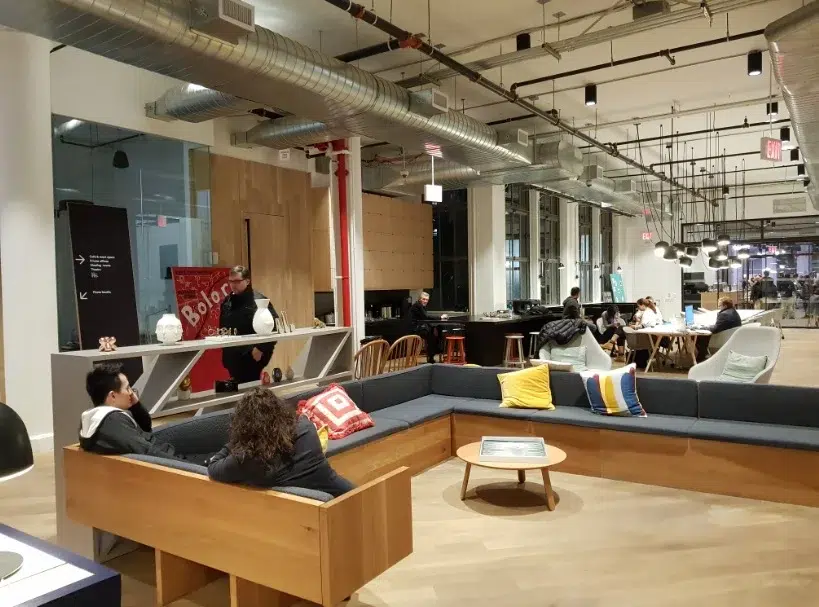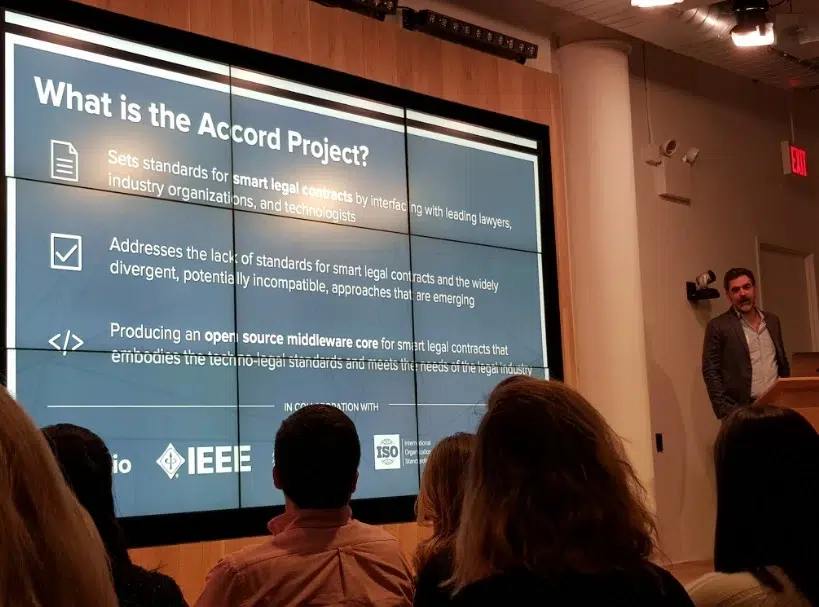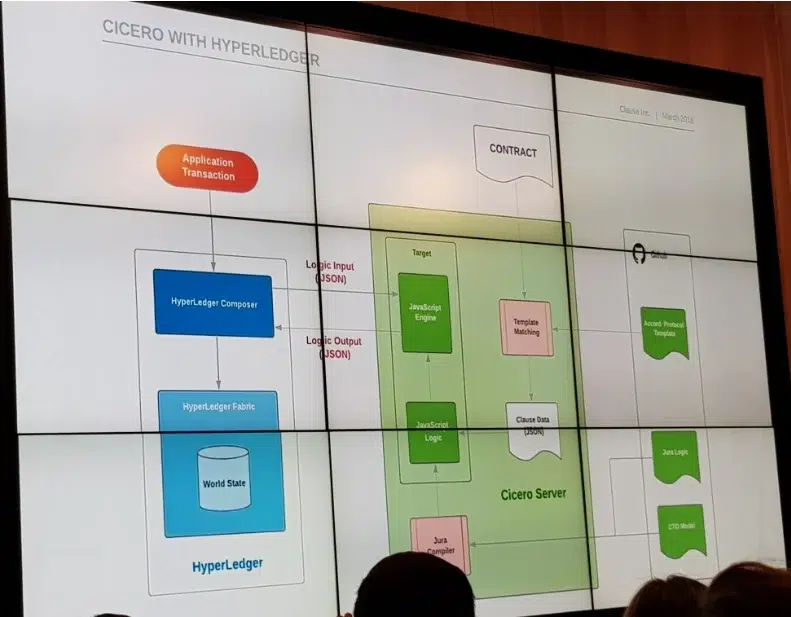James Waugh with the Hyperledger NYC and The Accord Project hosted the Composer workshop at Rise (43 W 23rd St, New York), with flatbread pizza, beer and wine courtesy of the event sponsor, BakerHostetler.

The event included a presentation and workshop led by the Accord Project, the world’s only organization focused on developing open-source standards for smart legal contracts.
Based on the Hyperledger Composer, it was a very interesting update on the blockchain standards and potential solutions for the legal industry.
It was very good to learn about Cicero (https://accordproject.org/projects/cicero/), where you can create reusable machine readable natural-language contracts and clauses using the Cicero templating system.
Cicero provides a universal format to structure clauses, sections, or whole contracts as machine readable objects that are capable of being searched, analyzed, and executed.
The Accord Project is a nonprofit initiative that operates in conjunction with IEEE, Hyperledger, Clio, the International Association for Contract and Commercial Management, Open Identity Exchange, Trusted IoT Alliance, the Sovrin Foundation, and many others to produce technical and legal standards for smart legal contracts, along with an open-source, blockchain-agnostic middleware protocol.
Comprised of seven working groups, the Accord Project is backed by some of the biggest law firms in the world, including K&L Gates, BakerHostetler, Holland & Knight, Linklaters, McDermott Will & Emery, and many others. The Project is also partnered with schools: NYU, Blockchain at Berkeley, the University College of London Centre for Blo00ckchain Technology, Cornell Tech, New York Law School, Vanderbilt, Wake Forest, and more.
The Open-source codebase is at https://github.com/accordproject

Dan Selman and Houman Shadab from Clause.io had previously elaborated about Making Legal Contracts Smart.
“The potential to automate a wide variety of business transactions in a way that is secure, transparent, and flexible will likely be one of the most transformational benefits of blockchain. However, software applications that use distributed ledger technology to automate business processes are often confusingly referred to as “smart contracts” despite not being tied to any legally binding obligation or, worse still, not being enforceable in court. In contrast are smart legal contracts: legally binding agreements whose underlying logic is transformed through computation to enable automation, software connectivity, and dynamic business arrangements”.
“The core of Cicero is a smart contract templating system made up of three components. The first is a template’s grammar, which consists of natural language contract text that identifies data-oriented variables such as price, date, etc. Second is the template’s data model that provides a framework for categorizing the variables and the components of the business context that operationalize smart contracts. Once the elements of a legal contract and the business context are categorized with a data-oriented modeling language, the contract can then be executed using the template’s operational logic — the third component of Cicero’s smart contract templating system.
We chose the Hyperledger Composer modeling language because it is a great fit for smart legal contracts and is able to be put to use immediately. Composer is general enough to model any type of contract and make them executable in a variety of environments — a core requirement the Accord Project’s protocol agnosticism”.
IEEE and The Accord Project Partnered to Develop Techno-Legal Standards:
The partnership began with development of a standards framework for optimizing the supply chain to drive industry adoption.
As announced on February 2018, “IEEE, the world’s largest technical professional organization dedicated to advancing technology for humanity, the IEEE Standards Association (IEEE SA) and the Accord Project, indicated the intention to develop techno-legal standards that address smart contract applications in a wide variety of areas, beginning with supply chain operations. Initially, the collaboration will involve creating a 12-member working team of critical stakeholders that includes supply chain operational executives, blockchain architecture technologists, smart contract developers, legal experts, and industry advocacy groups, in the hopes of ensuring a balanced consensus throughout the standards development process”.
Again Houman Shadab, Co-Founder of Clause.io previously had elaborated on why Techno-Legal Standards were needed for Smart Contracts:
“As the potential benefits of blockchain-based “smart contracts” become widely understood, a lingering question remains: how will they gain widespread adoption?
In the past, fundamental changes to the technical and legal aspects of markets were adopted not just by market forces but also by overt cooperation and coordination to develop standards. For example, in 1947 the International Organization for Standardization formed and since then has become a universally recognized source for providing standards that drive quality assurances and harmonization across a wide range of industries and business practices. Likewise, the International Swaps and Derivatives Association in the 1980s catalyzed the global market for financial derivatives by establishing standards for contract structures important practices such as risk management — which would be all but impossible without the standards”.

The Accord Project can be followed in Slack, with all standards for legal smart contracts.
While in Hyperledger, it is expected to support Ethereum and Corda.
In the workshop where addressed the legal and technical standards and open-source approach.
If was provided a perishable foods example in connection with internet of things (Trusted IoT alliance and Blockchain).
Several lawyers from many firms were participating in the meeting.

ZirconTech is seeing a great opportunity in the development of legal tech with blockchain based smart contracts.
This event has been a great opportunity to learn about The Accord Project and meet Clause.io team.
As a blockchain pioneer in Latin America, ZirconTech is always looking at the latest developments in Hyperledger technology in order to continue being a leading software application company. The development of blockchain based legal technology is a key element in the development roadmap of ZirconTech products and services.